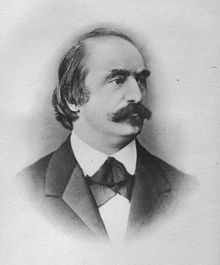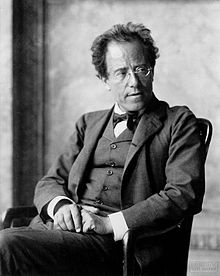This Week in Classical Music: December 19, 2022.Puccini and Christmas.Giacomo Puccini was born this week, on December 12th of 1858.Not long ago we came across a story involving him, it’s interesting but rather circuitous so bear with us for a moment.It starts with Michael Haas, the author of a very interesting book, The Forbidden Music, the story of Jewish composers and musicians banned by the Nazis – we highly recommend it.Mr. Haas runs a blog which we also find interesting.One of the recent entries was devoted to the 1903 article by Eduard Hanslick who reviewed the performance of Puccini’s La Bohème at the Vienna Hofoper, the court opera, conducted by Gustav Mahler. It’s fascinating, but we need to set the scene and try to put things into perspective.
Eduard Hanslick was a famous music critic (we had an entry about him several years ago).He worked for a Viennese newspaper called Die Neue Freie Presse (The New Free Press).The newspaper, probably the most influential in the Austrian Empire, was unusual in that it employed a large number of prominent Jewish writers, including Theodor Herzl, the founder of Zionism.Julius Korngold, the father of the composer Erich Wolfgang Korngold, also Jewish, succeeded Hanslick as the chief music critic. Remember that Austria at that time was highly antisemitic; Karl Lueger, the Mayor of Vienna at the time, was one of the leading antisemites.Hanslick, who worked at the newspaper for 40 years, was enormously influential.He was a preeminent supporter of the music of Brahms and a critic of Wagner, Bruckner, and Hugo Wolf (he also disliked Tchaikovsky’s Violin concerto, saying that it “stinks to the ear”).This was the person who wrote a scathing review of Puccini’s La Bohème, a production mounted under the supervision of the then Director of Hofoper, Gustav Mahler, who also conducted the premiere.
We know La Bohème as one of the most popular operas ever, and one of Puccini’s very best; it’s being staged constantly on every continent.In 1903, though, it was quite new: the premier was held in 1896 in Turin with the young Arturo Toscanini conducting.Practically at the same time Ruggero Leoncavallo, the author of Pagliacci, also wrote a La Bohème, now totally forgotten.It was based on the same book by Henri Murger and had a successful premiere; back then it wasn’t that clear which one was better (Hanslick, who hated both operas, didn’t hesitate to let us know which one he thought was worse).Then there is another aspect of the performance: in Austria, as in Germany, the UK, or Russia, operas were staged in the native language.Even though Hanslick liked the singing, La Bohème in German would probably grate our ears today.Finally, about the form of the article.It’s presented not as a brief review we would expect today but as a tremendously detailed, long account of all aspects of the performance.Some articles back then, called feuilleton, could run three-four pages – and people read them.This one is also long, so you may not want to read the whole thing, but skim it, it’s fun and Mr. Haas has wonderful photographs and musical snippets.
So here is the article.And here is O soave fanciulla from Act I, sung byRenata Tebaldi(Mimi) and Jussi Bjoerling(Rodolfo) in 1956.Hard to imagine that Hanslick didn’t like it.
Puccini, Hanslick, Christmas 2022
This Week in Classical Music: December 19, 2022. Puccini and Christmas. Giacomo Puccini was born this week, on December 12th of 1858. Not long ago we came across a story involving him, it’s interesting but rather circuitous so bear with us for a moment. It starts with Michael Haas, the author of a very interesting book, The Forbidden Music, the story of Jewish composers and musicians banned by the Nazis – we highly recommend it. Mr. Haas runs a blog which we also find interesting. One of the recent entries was devoted to the 1903 article by Eduard Hanslick who reviewed the performance of Puccini’s La Bohème at the Vienna Hofoper, the court opera, conducted by Gustav Mahler. It’s fascinating, but we need to set the scene and try to put things into perspective.
involving him, it’s interesting but rather circuitous so bear with us for a moment. It starts with Michael Haas, the author of a very interesting book, The Forbidden Music, the story of Jewish composers and musicians banned by the Nazis – we highly recommend it. Mr. Haas runs a blog which we also find interesting. One of the recent entries was devoted to the 1903 article by Eduard Hanslick who reviewed the performance of Puccini’s La Bohème at the Vienna Hofoper, the court opera, conducted by Gustav Mahler. It’s fascinating, but we need to set the scene and try to put things into perspective.
Eduard Hanslick was a famous music critic (we had an entry about him several years ago). He worked for a Viennese newspaper called Die Neue Freie Presse (The New Free Press). The newspaper, probably the most influential in the Austrian Empire, was unusual in that it employed a large number of prominent Jewish writers, including Theodor Herzl, the founder of Zionism. Julius Korngold, the father of the composer Erich Wolfgang Korngold, also Jewish, succeeded Hanslick as the chief music critic. Remember that Austria at that time was highly antisemitic; Karl Lueger, the Mayor of Vienna at the time, was one of the leading antisemites. Hanslick, who worked at the newspaper for 40 years, was enormously influential. He was a preeminent supporter of the music of Brahms and a critic of Wagner, Bruckner, and Hugo Wolf (he also disliked Tchaikovsky’s Violin concerto, saying that it “stinks to the ear”). This was the person who wrote a scathing review of Puccini’s La Bohème, a production mounted under the supervision of the then Director of Hofoper, Gustav Mahler, who also conducted the premiere.
in that it employed a large number of prominent Jewish writers, including Theodor Herzl, the founder of Zionism. Julius Korngold, the father of the composer Erich Wolfgang Korngold, also Jewish, succeeded Hanslick as the chief music critic. Remember that Austria at that time was highly antisemitic; Karl Lueger, the Mayor of Vienna at the time, was one of the leading antisemites. Hanslick, who worked at the newspaper for 40 years, was enormously influential. He was a preeminent supporter of the music of Brahms and a critic of Wagner, Bruckner, and Hugo Wolf (he also disliked Tchaikovsky’s Violin concerto, saying that it “stinks to the ear”). This was the person who wrote a scathing review of Puccini’s La Bohème, a production mounted under the supervision of the then Director of Hofoper, Gustav Mahler, who also conducted the premiere.
We know La Bohème as one of the most popular operas ever, and one of Puccini’s very best; it’s being staged constantly on every continent. In 1903, though, it was quite new: the premier was held in 1896 in Turin with the young Arturo Toscanini conducting. Practically at the same time Ruggero Leoncavallo, the author of Pagliacci, also wrote a La Bohème, now totally forgotten. It was based on the same book by Henri Murger and had a successful premiere; back then it wasn’t that clear which one was better (Hanslick, who hated both operas, didn’t hesitate to let us know which one he thought was worse). Then there is another aspect of the performance: in Austria, as in Germany, the UK, or Russia, operas were staged in the native language. Even though Hanslick liked the singing, La Bohème in German would probably grate our ears today. Finally, about the form of the article. It’s presented not as a brief review we would expect today but as a tremendously detailed, long account of all aspects of the performance. Some articles back then, called feuilleton, could run three-four pages – and people read them. This one is also long, so you may not want to read the whole thing, but skim it, it’s fun and Mr. Haas has wonderful photographs and musical snippets.
being staged constantly on every continent. In 1903, though, it was quite new: the premier was held in 1896 in Turin with the young Arturo Toscanini conducting. Practically at the same time Ruggero Leoncavallo, the author of Pagliacci, also wrote a La Bohème, now totally forgotten. It was based on the same book by Henri Murger and had a successful premiere; back then it wasn’t that clear which one was better (Hanslick, who hated both operas, didn’t hesitate to let us know which one he thought was worse). Then there is another aspect of the performance: in Austria, as in Germany, the UK, or Russia, operas were staged in the native language. Even though Hanslick liked the singing, La Bohème in German would probably grate our ears today. Finally, about the form of the article. It’s presented not as a brief review we would expect today but as a tremendously detailed, long account of all aspects of the performance. Some articles back then, called feuilleton, could run three-four pages – and people read them. This one is also long, so you may not want to read the whole thing, but skim it, it’s fun and Mr. Haas has wonderful photographs and musical snippets.
So here is the article. And here is O soave fanciulla from Act I, sung by Renata Tebaldi (Mimi) and Jussi Bjoerling (Rodolfo) in 1956. Hard to imagine that Hanslick didn’t like it.
And of course, Merry Christmas to all!